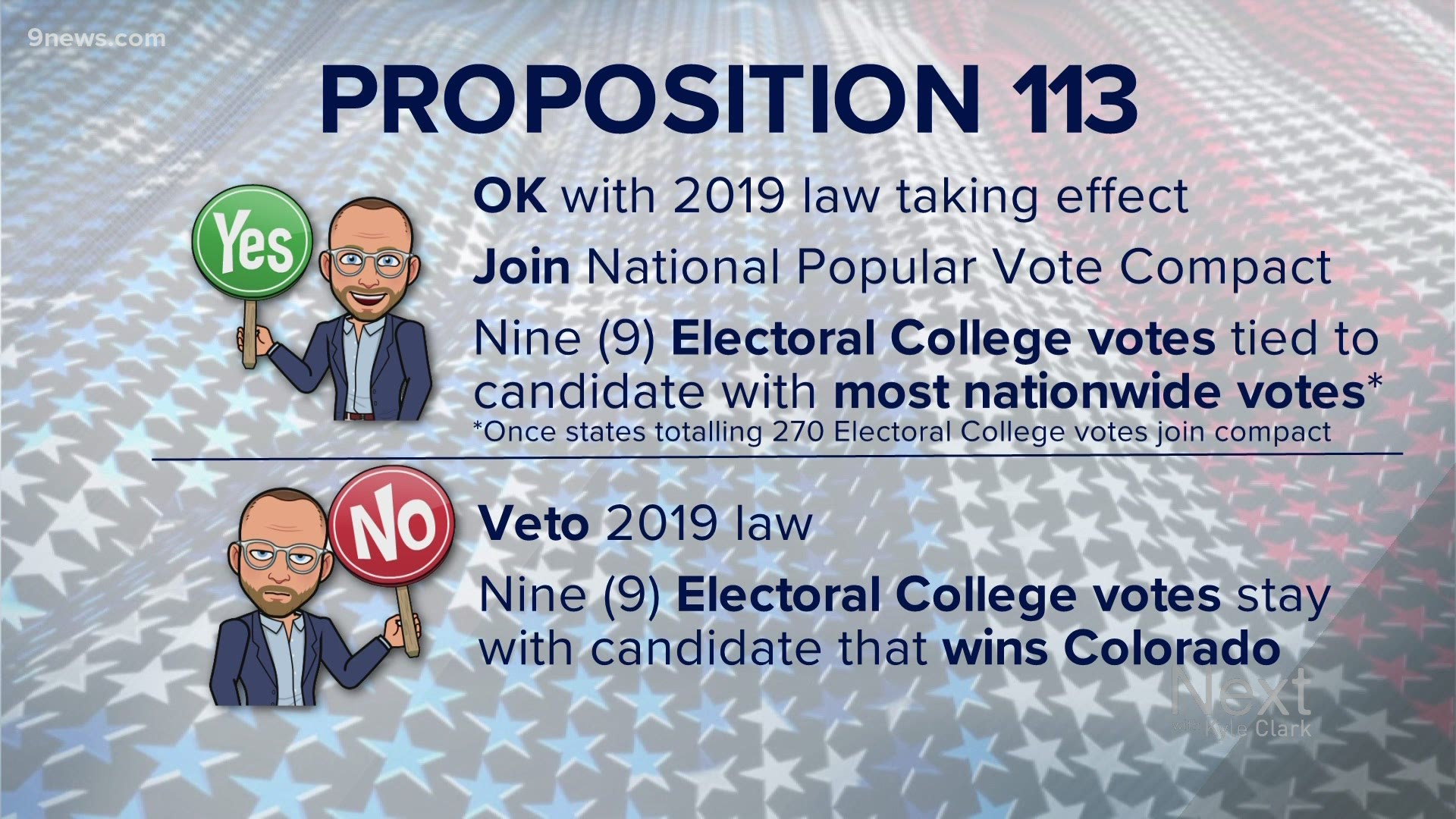DENVER — This story is part of a series of statewide ballot issue reviews for Next with Kyle Clark we're calling "We Don't Have To Agree, But Let's Just Vote." We'll continue to look at statewide ballot initiatives on Colorado's ballot and how they would impact you.
Proposition 113 isn't your traditional ballot issue.
It was put on your ballot by citizens who collected more than 124,632 valid signatures to try to veto a 2019 bill passed by the legislature and signed into law by Democratic Gov. Jared Polis in March 2019.
The National Popular Vote Compact would put Colorado in a queue with 14 other states and Washington, D.C. to eventually tie our Electoral College votes with the presidential candidate that receives the most votes nationwide, and not the most votes in Colorado.
This wouldn't take effect this year, even if Colorado voters pass this proposition. It won't take effect until enough states equaling 270 Electoral College votes or more agree to the compact.
The last time a law was challenged by voters was in 1932, when voters prevented the legislative-passed tax on oleomargarine to increase from $0.10 per pound to $0.15 per pound.
PROPOSITION 113
A YES vote means you're OK with the state keeping the 2019 law that puts Colorado in the National Popular Vote compact.
Once enough states join the compact -- states equaling 270 Electoral College votes or more -- Colorado's Electoral College votes would go to the candidate who gets the most votes nationwide, which might not be the same candidate who received the most votes in Colorado.
A NO vote vetoes the law signed by Polis and Colorado does not join the National Popular Vote compact.
Colorado would continue to award its Electoral College votes to the presidential candidate that gets the most votes in Colorado.
The last presidential election in 2016 was the fifth time in United States history that a candidate won the election by earning the required Electoral College votes, despite not getting the most votes nationwide.
The National Popular Vote compact currently has 14 states in agreement, along with Washington, D.C. The states are: California, Connecticut, Delaware, Hawaii, Illinois, Maryland, Massachusetts, New Jersey, New Mexico, New York, Oregon, Rhode Island, Vermont and Washington.
Those states and D.C. total 187 Electoral College votes. If Colorado voters approve Proposition 113, then it will equal 196 Electoral College votes.
To become President, you need to earn 270 Electoral College votes.
In 2016, every state in the compact, including Colorado, voted for Democratic candidate Hillary Clinton. While she received the most votes nationwide (65.8 million), Republican Donald Trump (62.9 million) earned 304 Electoral College votes.
In 2000, when Republican President George Bush won reelection with 271 Electoral College votes, Democratic challenger Al Gore received 50.9 million votes compared to Bush's 50.4 million votes. Colorado is the only state among the compact states that voted for Bush. If the National Popular Vote compact were to have been in place in 2000, Colorado's Electoral College votes would have gone to Gore instead of Bush.
Colorado's Electoral College votes would have also changed in 1996, 1976, 1960, 1944, 1940, 1908, 1900 1896, 1892, 1888, 1884 and 1876.
The other elections where the winning candidate did not receive the most nationwide votes were:
1888: Benjamin Harrison over Grover Cleveland
- Harrison: 233-168 Electoral College votes
- Cleveland 5.5 million-5.4 million popular votes
1876: Rutherford B. Hayes over Samuel J. Tilden
- 185 Electoral College votes for Hayes to 184 for Tilden
- Tilden received 4.3 million votes to Hayes' 4.0 million
1824: John Quincy Adams over Andrew Jackson, William H. Crawford and Henry Clay
- This election was decided by the House of Representatives. No candidate received a majority of the Electoral College votes. There were 261 available, and no one received 131
- Jackson received 99 Electoral College votes to Adams' 84
- Jackson also received 153,544 votes to Adams' 108,740
SUGGESTED VIDEOS: Breaking down Colorado's 2020 ballot

